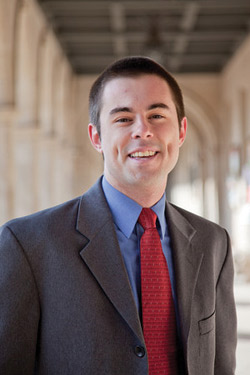mez | News | Student Union
Mattea to resign as vice president of administration
10 resignations this term raise questions about SU internal affairs

Trevor Mattea, SU vice president of administration, will be resigning in two weeks. (Courtesy of the Montana Administration)
Student Union Vice President of Administration Trevor Mattea announced Monday that he would be resigning from his post in two weeks. His resignation is the second for the Montana administration, raising questions about Student Union’s internal efficacy.
A member of Treasury resigned late Tuesday night and seven SU senators have also stepped down this term.
“It’s a wake up call; we really need to transform Student Union,” SU President Jeff Nelson said of the Senate and Executive Council resignations.
Mattea, a junior, said he resigned because he was not satisfied with some of the aspects of how SU operates.
“I fear that sometimes things are done because they’ve been done before and there’s a hesitancy, or people are slow, to step back and reassess things and think outside the box,” Mattea said.
An SU press release stated that Mattea was frustrated with the bureaucratic structure of his position and his inability to make a “noticeable difference in the lives of students.”
Second executive resignation in two months
The resignation comes less than two months after Courtney Reeves, former vice president of public relations, resigned for “personal reasons.”
Mattea said he views his resignation as different from Reeves’.
“[For me,] it wasn’t an issue of time and having enough time, it was more of an issue of, ‘How am I spending my time?’ Is it something where I feel like I’m having a worthwhile participation, and is it making me happy? More and more, the answers to those questions were ‘no.’”
Jill Carnaghi, associate vice chancellor for students and dean of campus life, agreed that the executives stepped down for their own reasons.
“I think each of them made the tough call for themselves,” Carnaghi said. “The most difficult thing can be, ‘I can’t complete what I said I was going to do.’”
While Nelson acknowledged that many students do not understand the full extend of their responsibilities until they actually hold that position, he said his focus is on the student body rather than on the students who work within student union.
“My focus is not so much on the internal specifics,” Nelson said. “I’m more concerned with the results for students.”
Questions about the VP of administration position, SU structure
As for the position of vice president of administration, which Nelson held last year, Nelson said he understands Mattea’s frustrations with the job.
“It’s very internal-focused, and it’s hard to see how you make an impact on students,” Nelson said.
The position of vice president of administration involves the oversight of internal aspects of SU and many of the day-to-day issues of student government, such as rules, office supplies and room reservation.
“Perhaps I misunderstood exactly what the position was or what the day-to-day job was. I wasn’t aware of how the things I was obligated to do—the day-to-day office stuff—was going to bog me down from doing my own projects,” Mattea said. “Its hard to have the enthusiasm to do the things you really want to do once you complete the things you’re obligated to do.”
Senior Chase Sackett, speaker of SU Senate, said he thought Mattea’s resignation was not a reflection on the structure of Student Union but rather on the position of vice president of administration itself.
“I don’t think it’s an SU thing. I think it’s more about what that position is. I can completely understand why Trevor would be unsatisfied with that position,” Sackett said. Sackett served as a senator while Mattea was the chair of the Campus Services Committee.
Junior Jack Novick, an SU Senator, said the resignation will not change his thinking on student government.
“It doesn’t really make me feel any differently about Student Union,” Novick said. “It’s more moving on the same path we’ve been on, moving toward changing from a bureaucratic self-serving organization to more outreach and more activism.”
The resignations have caused SU members to reconsider how students understand SU.
Nelson said that the executive branch is looking to create an “inside SU” program that hosts events highlighting each position in the body. This would increase awareness about Student Union and its functions and educate those planning to run. Another suggestion has been to more explicitly outline each executive position in the constitution so that candidates are more aware of what they are getting into.
“I’d like to see Student Union be realistic about what it can do and give less emphasis to the idea that we’re changing school policy because that’s not usually the case,” Mattea said. “I won’t say that students or Student Union reps aren’t involved in some decisions because they are, but to say that’s most of what we do would be inaccurate.”
With additional reporting by Perry Stein
